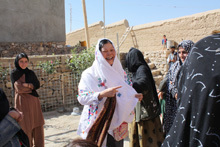
Names such as the Swat Valley and the Kashmir Mountains are becoming increasingly familiar to Americans as Afghanistan and Pakistan regularly command the news, mostly due to the violence and conflict that continue to convulse the countries.
But for Carolyn Y. Woo, recently returned from a trip through both countries, the names are more than headlines. They carry strong images of the people she met, often living in harsh poverty, but with a spirit of hospitality, enterprise and hope.
Woo, Martin J. Gillen Dean of the Mendoza College of Business at the University of Notre Dame, traveled through Afghanistan and Pakistan with representatives from Catholic Relief Services (CRS) from July 27 to Aug. 5. A member of the CRS Board of Directors, she journeyed from major cities to remote villages, seeing first-hand the organization’s relief work aimed at improving education, agriculture, water resources and other significant needs. CRS is the official international humanitarian agency of the U.S. Conference of Catholic Bishops dedicated to providing assistance to people in need in more than 100 countries.
“The decision to go was a difficult one, because of the ongoing violence and insecurity,” Woo said. “But I felt that it was extremely important to visit these places, to meet the people and see where Catholic Relief Services is making differences in lives. And despite the seemingly overwhelming challenges, there really are reasons for hope.”
During the trip, Woo visited Mardan, where thousands of people who fled fighting between the Taliban and the Pakistani army stayed as they waited for the all-clear to go home. CRS has built thatched-roof shelters and new latrines for the displaced people, and given them non-food essentials, including mats for praying.
“As this is a farming area, space is not an issue. People just camp on their relatives’ land,” Woo said. “One farmer we visited hosted nine families. This gave me a profound sense of what family and hospitality mean. While space is not a challenge, proper shelter and sanitation facilities are urgently needed.”
Woo also spent time at a primary school in Pakistan’s Kashmir Mountains, which CRS built at the site of a devastating earthquake that occurred in 2005. In the remote town of Chaghcharan, Afghanistan, she walked through wheat fields and green terraces grown on formerly barren land with the help of CRS irrigation systems.
In Kabul, Woo visited the U.S. Embassy, meeting with a deputy ambassador and staff members to describe the CRS approach. During her stay, Taliban militants fired missiles targeted at the international airport and other government buildings as a pre-election warning.
Though Woo primarily observed humanitarian projects in Afghanistan, she also saw signs of economic rebuilding. Some CRS-sponsored projects involved planting fruit trees, wheat and other revenue-producing crops that can replace the poppies grown for opium trade. Other ventures were smaller and entrepreneurial in nature, including a bakery headed by a woman who previously lost her 5-year-old son to starvation.
“The work that Catholic Relief Services is doing in these countries is so vital,” Woo said. “But there is a testimony here, too, for the power of business to change lives. As a business educator, I find this to be an increasingly important message to pass on to our students. Economic enterprises must serve people, not the other way around.”
To read more of Woo’s travels though Afghanistan and Pakistan, visit
http://business.nd.edu/ask_more/asking_more_commentary/ on the Web.
Woo assumed the deanship of the Mendoza College of Business at the University of Notre Dame in 1997. Her research focuses on strategy, entrepreneurship and organizational systems. She lectures regularly on individual integrity, ethical systems and corporate citizenship, and recently addressed U.N. Secretary-General Ban Ki-moon during the first Global Forum for Responsible Management Education. She holds honorary doctorates from the University of St. Francis and Providence College.
Woo was elected chair of the AACSB International, the global accreditation body for business schools in 2002.
The Mendoza College of Business at the University of Notre Dame is home to about 2,200 students in the bachelor of business administration, master of business administration, executive master of business administration, master of science in accountancy and master of nonprofit administration degree programs. The business school was founded in 1921 as the College of Foreign and Domestic Commerce and became the Mendoza College of Business in 2000 as a result of a naming gift from Kathy and Tom Mendoza, a 1973 Notre Dame graduate and vice chairman at data technology company NetApp Inc.
The college’s continuing mission is to build a premier Catholic business school that fosters academic excellence, professional effectiveness and personal accountability in a context that strives to be faithful to the ideals of community, human development and individual integrity.
More information about the Mendoza College is available at http://business.nd.edu on the Web.